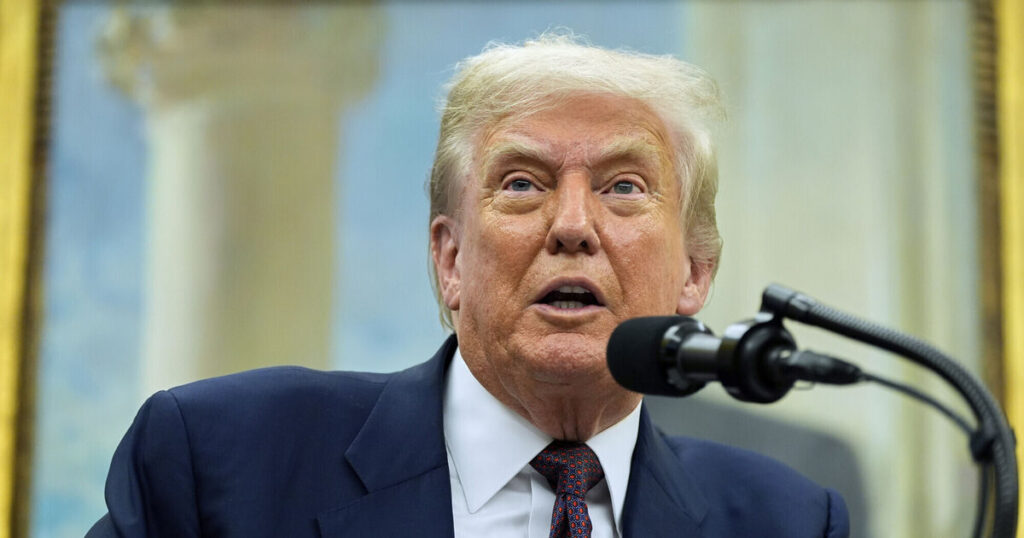The Kremlin has announced that a meeting is being planned between Russian President Vladimir Putin and US President Donald Trump.
According to Yuri Ushakov, Mr. Putin’s foreign affairs advisor, the two sides are actively working on the arrangements, and a venue has been agreed upon, with an official announcement forthcoming.
This announcement coincides with a new Gallup poll indicating a growing desire among Ukrainians for a settlement to end the conflict stemming from Russia’s invasion.
This meeting, if it occurs, would be the first between the two presidents since Mr. Trump’s return to office this year.
It would represent a significant point in the ongoing war, which has lasted for over three years. However, the meeting’s potential to bring an end to the hostilities remains uncertain, given the considerable differences in demands between Russia and Ukraine.
The current sentiment towards a negotiated settlement marks a substantial shift from 2022, when the war began. At that time, a Gallup poll revealed that approximately three-quarters of Ukrainians favored continued fighting until victory was achieved.
Currently, only about a quarter of Ukrainians maintain that view, with support for prolonging the war steadily declining across all regions and demographic groups.
The Gallup findings are based on surveys of 1,000 or more individuals aged 15 and older residing in Ukraine.
Due to accessibility constraints, certain territories under long-term Russian control, encompassing roughly 10% of the population, were excluded from surveys conducted after 2022.
Since the war’s escalation, Russia’s sustained bombardment of urban areas behind the front lines has resulted in the deaths of over 12,000 Ukrainian civilians, according to the United Nations.
On the 1,000-kilometer (620-mile) front line stretching from northeast to southeast Ukraine, Russia’s larger military force is steadily gaining territory, resulting in tens of thousands of casualties on both sides.
The Gallup poll was released just before Mr. Trump’s Friday deadline for Russia to cease hostilities or face significant economic repercussions.
The new Gallup survey, conducted in early July, indicates that approximately seven in ten Ukrainians believe their country should actively pursue a negotiated settlement as quickly as possible.
Ukrainian President Volodymyr Zelenskyy recently reiterated his willingness to meet with Mr. Putin. However, this offer was rejected, as Russia remains firm on its demands, and the two sides remain significantly divided.
The poll indicates that most Ukrainians do not foresee a lasting peace in the near future.
Only about one-quarter of respondents believe it is “very” or “somewhat” likely that active conflict will end within the next 12 months, while roughly seven in ten consider it “somewhat” or “very” unlikely.
Ukrainian perceptions of the American government have deteriorated in recent years, while positive opinions of Germany’s leadership have increased, according to Gallup.
Three years ago, approximately two-thirds of Ukrainians held a favorable view of US leadership.
This number has since declined to 16% in the most recent poll, reflecting the new tensions between the two countries since Mr. Trump assumed office in January.
While the decrease from the previous year is notable – US leadership approval was 40% in 2024 – positive opinions of US leadership were already trending downward before Mr. Trump’s inauguration, possibly due to the critical stance of some Republican politicians towards the substantial US aid provided to Ukraine.
Germany has gained popularity among Ukrainians, with approval ratings rising to 63% in the latest poll.
Ukrainians are considerably less optimistic about their country’s prospects for joining NATO or the European Union in the next decade compared to just a few years ago.
According to the new poll, about one-third of Ukrainians anticipate that Ukraine will be accepted into NATO within the next 10 years, while roughly one-quarter think it will take longer, and one-third believe it will never happen.
This represents a decrease from 2022, when approximately two-thirds of Ukrainians believed NATO acceptance would occur within the coming decade, and only about one in ten thought it would never happen.
Hopes for EU membership are higher but have also diminished.
Currently, 52% of Ukrainians expect to become part of the EU within the next decade, down from 73% in 2022.


